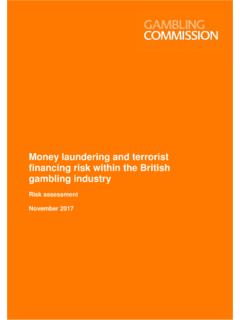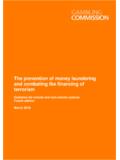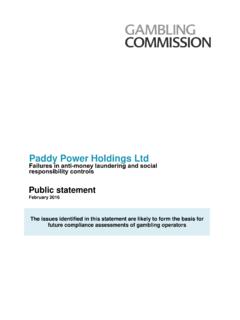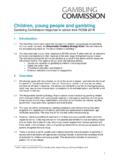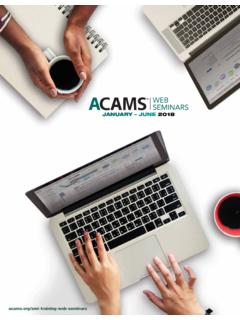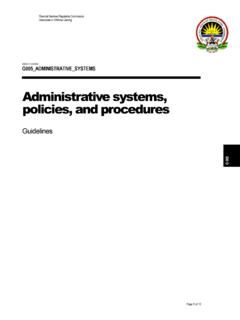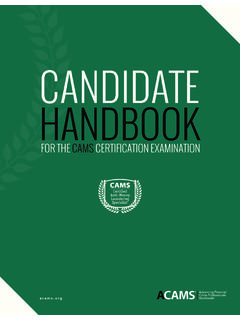Transcription of Virtual currencies eSports and social gaming …
1 Victoria Square House Victoria Square Birmingham B2 4BP T 0121 230 6666 F 0121 230 6720 Virtual currencies , eSports and social gaming discussion paper August 2016 1 Executive summary Providing facilities for gambling without a licence, or an exemption applying, is a criminal offence. Gambling is defined as betting, gaming or participating in a lottery. Those definitions distinguish the activities which need to be licensed and other activities which, although they combine expenditure and the influence of chance, do not need to be licensed. There are many ways in which individuals and organisations can provide facilities for gambling, or take part in gambling. This paper sets out the Gambling Commission s current thinking and approach to distinguishing between activities that need to be licensed and activities that do not.
2 This paper briefly explains the legal framework governing remote gambling in the UK and sets out the Commission s thinking on: Virtual currencies and in-game items, which can be used to gamble gambling on eSports social gaming . The Commission is focussing on Virtual currencies , eSports and social gaming products, in particular, as they create issues for regulation and player protection for a number of reasons, because: the lines between some social gaming products and gambling are blurring technological developments and the expansion of digital or Virtual currencies mean that operators of some social gaming products may be offering facilities for gambling the growth in the market for gambling on eSports raises new issues.
3 Taking action against those offering facilities for gambling without a licence has always been a priority for the Commission. Taking action against anyone offering facilities for gambling to children and young people is a particularly high priority. By exploring how existing statutory definitions may apply to new innovations, our aim is to help businesses avoid providing facilities for gambling without a licence. Our starting point is to explain how the Commission distinguishes between activities that it considers must be licensed and activities that do not need to be licensed. The paper is also intended to promote a discussion with interested parties, including operators, lawyers and regulators, about some other emerging issues which create issues for regulation and player protection.
4 Virtual currencies , eSports and social gaming 2 2 What is gambling? The fundamental concept in the Gambling Act 2005 (the Act) is the concept of providing facilities for gambling. Offering facilities for gambling without a licence, or an exemption applying, is a criminal offence. Gambling is defined as betting, gaming or participating in a lottery. That definition distinguishes activities which need to be licensed and other activities which do not. Betting Betting is defined, in section 9 of the Act, as making or accepting a bet on: the outcome of any race, competition or other event or process; the likelihood of anything occurring or not occurring; or whether anything is or is not true.
5 A transaction may still be a bet despite the fact that the race, competition or event has already taken place and one party to the transaction knows the outcome. There are several different ways in which facilities for betting can be offered: fixed odds betting pool betting acting as a betting intermediary spread betting1. Fixed odds betting takes place when the customer places a fixed stake and the amount they can win is calculated by reference to the odds offered by the other party to the bet. For example a 10 bet at odds of 2/1 would return 30 ( 20 of winnings and the 10 stake) if successful; if unsuccessful the customer would lose their 10 stake. Pool betting is defined in section 11 of the Act.
6 Pool betting differs from fixed odds betting as all or part of the winnings are determined by reference to the aggregate of stakes paid into the pool or agreed to be paid or divided among the winners, or the winnings are something other than money. The football pools would be an example of pool betting. Some prize competitions will also fall within the definition of betting if they satisfy specified conditions. One of the conditions is a requirement to pay to enter. An example of a prize competition that would fall within the definition of betting would be certain "fantasy football" style competitions depending on how they are structured. In contrast a prize crossword competition will not fall within the definition of betting where the elements of prediction and wagering are not both present.
7 A betting intermediary is defined in section 13 of the Act as a person who provides a service designed to facilitate the making or acceptance of bets between others. A betting intermediary is not a party to a bet; instead they introduce the parties to the bet and typically hold their stakes before paying the winner after deducting a commission. An example of a betting intermediary would be a betting exchange. gaming gaming is defined in section 6 of the Act as playing a game of chance for a prize. Game of chance is defined as including a game that: involves both an element of chance and an element of skill involves an element of chance that can be eliminated by superlative skill is presented as involving an element of chance.
8 Sports are excluded from the definition of a game of chance. 1 Spread betting is regulated by the Financial Conduct Authority; section 10 Gambling Act 2005. A spread bet is a certain type of bet on the future performance of, for example, a financial market, including indices, shares, currencies and commodities. The customer agrees with the operator that each will pay to the other a specified sum per point (the stake) in respect of movements in a nominated index linked to the market or other event (which can include sporting events). Virtual currencies , eSports and social gaming 3 A person plays a game of chance if he participates in a game of chance whether or not there are other participants in the game, and whether or not a computer generates images or data taken to represent the actions of other participants in the game.
9 Importantly, a person plays a game of chance for a prize if he plays the game and thereby acquires a chance of winning a prize, whether or not he risks losing anything at the game. A prize, in relation to gaming , means money or money s worth and includes both a prize provided by a person organising gaming and winnings of money staked. The definition of gaming means that players do not need to stake anything before offering facilities for gaming will need to be licensed. We discuss the implications of this and our views on what amounts to money or money s worth in more detail later in this paper. Lottery Lottery is defined in section 14 of the Act. An arrangement is a simple lottery if persons are required to pay in order to participate in the arrangement, if in the course of the arrangement one or more prizes are allocated to one or more members of a class and if the prizes are allocated by a process which relies wholly on chance.
10 An arrangement is a complex lottery if persons are required to pay in order to participate in the arrangement, if in the course of the arrangement one or more prizes are allocated to one or more members of a class, if the prizes are allocated by a series of processes and if the first of those processes relies wholly on chance. Prize, in relation to lotteries, is defined as including any money, articles or services, whether or not described as a prize and whether or not consisting wholly or partly of any money paid, or articles or services provided, by the members of the class among whom the prize is allocated. Genuine prize competitions would not be considered a lottery and would not be prohibited.
